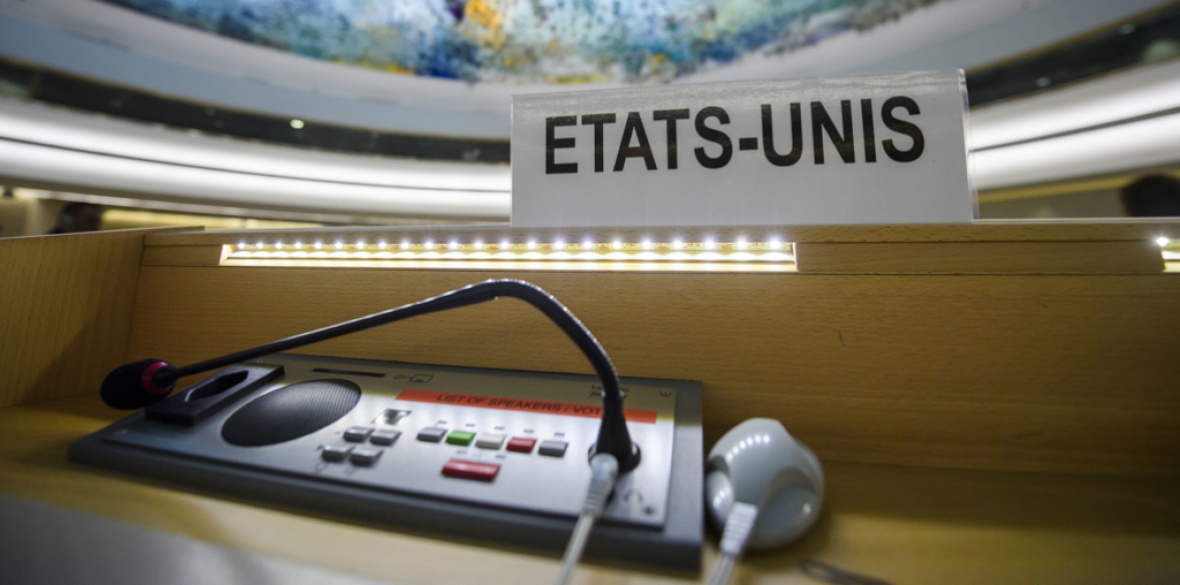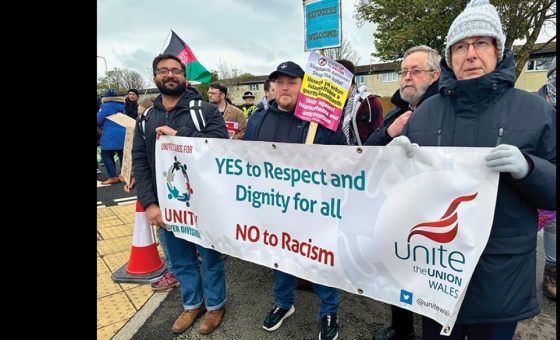This is the last article you can read this month
You can read more article this month
You can read more articles this month
Sorry your limit is up for this month
Reset on:
Please help support the Morning Star by subscribing here
ON June 19 the United States withdrew from the UN council for human rights. The reasons? US ambassador to the UN Nikki Haley described the council as a “cesspool of political bias” and criticised its “unceasing hostility towards Israel.” US Secretary of State Mike Pompeo accused the council of “shameless hypocrisy” and of “enabling human rights abuses by absolving wrongdoers by silence.”
The US withdrawal was backed by the Israeli Prime Minister Benjamin Netanyahu, who described the council as a “biased, hostile, anti-Israel organisation that has betrayed its mission of protecting human rights.”
The EU, on the other hand, reasserted its “steadfast commitment to the human rights council.”
Its spokesperson Maja Kocijancic described the US withdrawal as risking “undermining the role of the US as a champion and supporter of democracy.”
What, therefore, is the significance of this move? Is it another short-term, impetuous gesture by the Trump administration or something longer-term and strategic?
The UN’s oversight of human rights has been a problem for the United States for some time. The council’s predecessor, the UN commission for human rights, was wound up by Kofi Annan in 2006 after prolonged criticism from the US.
In 2001 UN members had voted the US off the commission after George W Bush failed to ratify the Kyoto protocol on climate change and reactivated the US’s nuclear missile shield.
In 2002 the commission had tangled with the US over Palestine when it recognised, for the occupied territories, the “legitimate right of the Palestinian people to resist the Israeli occupation in order to free its land.” The following year Syria moved for the investigation of US war crimes in Iraq.
Annan’s reorganisation was meant to insulate the new council from such pressures. However, Bush refused to join the new council and it was not until 2009 that Barack Obama restored US membership.
The role of both bodies was, and is, the defence of the Universal Declaration of Human Rights, adopted by the UN in 1948.
Previously the commission’s members had been elected in full session by all UN member countries.
Post-2006 the council has been composed of 47 members, each elected for three years from five separate regional constituencies.
Is the new breach a matter of impulse and irritation or does it mark a more strategic shift?
There are certainly grounds for irritation. The council had established an inquiry into extreme poverty in the US, the 40 million who live in absolute poverty.
When the special rapporteur Philip Alston gave his initial report last week, he responded to Haley’s “cesspool” comments by drawing attention to the raw sewage flowing in the streets of Alabama, “remarkably close to the Capitol.”
Haley had previously been governor of South Carolina, and for a long period defiantly defended the decision to fly the flag of the slave-owning Confederates.
Yet there are strong reasons for believing that the decision is more strategic and therefore more dangerous.
They relate to the Trump administration’s decision to align itself far more unilaterally to Saudi Arabia and Israel in a bid to reassert physical control over the Middle East and its natural resources.
Two actions by the human rights council have rendered this new alignment more difficult and problematic.
The first was in September 2017 when the council established a committee to investigate what it described as a “man-made catastrophe” in Yemen: “it is vital that those who inflicted such violations are held to account.”
The committee is scheduled to report its findings in September. Criticism of Saudi Arabia, its allies and arms suppliers would seem inevitable.
The second concerns Israel. There has been a longstanding anger by Israel at a standing item on the agenda of all council meetings: “the human rights situation in Palestine and other occupied Arab territories.”
Following the Gaza shootings on May 18, the council voted to launch a war crimes investigation — condemning the “disproportionate and indiscriminate use of force by the Israeli occupying forces against Palestinian civilians, including in the context of peaceful protest, particularly in the Gaza Strip.”
This is also due to report over the next 12 months. Combined these two initiatives will provide a very inauspicious background to any military actions by Israel and Saudi Arabia to change the balance of military forces in Syria, Iraq and the Gulf.
This would seem to be why the US seeks to discredit the UN council at an early stage and to claim that it is obsessively focused on hostility to Israel. However, this claim bears little relation to the reality of the council’s work.
A cursory examination of its current agenda shows that it has ongoing investigations into human rights abuses in Myanmar, Burundi, South Sudan and the Democratic Republic of Congo, that it has just published a report on war crimes in Eastern Ghouta (Syria) and that its recent sessions examined issues of displaced persons, the rights of women and issues of sexual orientation and gender identity.
The action of the US is therefore deeply worrying. Whatever reservations socialists may have had in the past about the 1948 Universal Declaration, particularly its initial failure to embrace collective and economic rights, it is important to defend the role of the human rights council today.
The US attack would seem to presage a very serious threat to world peace in the Middle East, one that is linked to a wider assertion of US control over strategic resources against competing economic blocs.
It is also important ideologically. The attack by the US administration represents part of its drive to consolidate support for a right-wing populist world view not just within the US but more generally — a world view in which the major threats to human rights are today posed by countries like Venezuela, Cuba and Nicaragua and anyone who questions the rights of property and big business.
John Foster is international secretary of the Communist Party.










